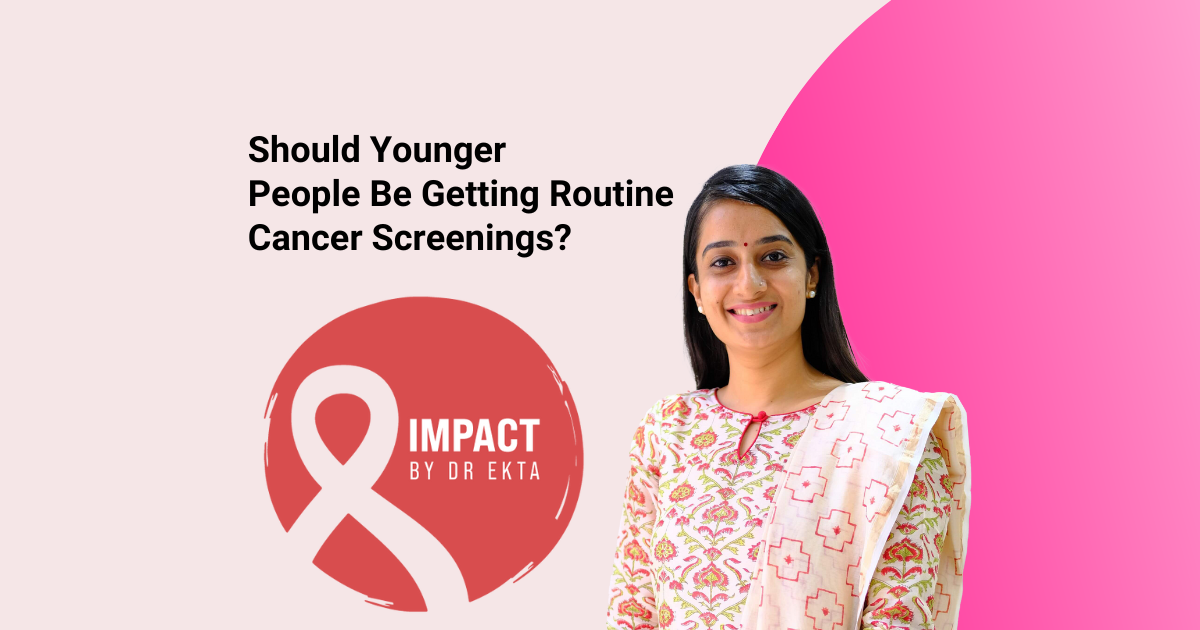I often encounter young adults who believe that cancer is a disease of old age. While it is true that the risk of many cancers increases with age, the rising incidence of cancer among younger individuals is a cause for concern. This brings us to an important question: Should younger people be getting routine cancer screenings?
Understanding Cancer Screenings
Cancer screenings are medical tests designed to detect cancer in its early stages, often before symptoms appear. Early detection can lead to more effective treatment and better survival rates. However, routine cancer screenings are typically recommended based on age, family history, and risk factors.
Why Are Younger People at Risk?
While most cancers are more common in older adults, certain types of cancer are increasingly being diagnosed in younger individuals. Some reasons for this include:
Genetic predisposition: A family history of cancer can significantly increase risk.
Lifestyle factors: Poor diet, lack of exercise, smoking, alcohol consumption, and obesity contribute to early cancer development.
Environmental exposures: Pollutants, radiation, and carcinogens in food or workplaces may trigger cancer earlier than expected.
Hormonal changes: Some cancers, like breast and ovarian cancer, can be influenced by hormonal imbalances.
Which Cancers Should Younger People Be Screened For?
The need for cancer screenings among younger individuals depends on personal and family medical history. Here are some cancers that may require early screening:
1. Breast Cancer
While routine mammograms are recommended from age 40, younger women with a family history of breast cancer should consider earlier screenings.
Genetic testing for BRCA1 and BRCA2 mutations can help assess risk.
2. Cervical Cancer
The Pap smear and HPV test are recommended for women starting at age 21 to detect early changes that could lead to cervical cancer.
3. Colorectal Cancer
Traditionally, colonoscopy screenings start at age 45, but younger individuals with a family history or symptoms like rectal bleeding and persistent digestive issues may need earlier screening.
4. Skin Cancer
Regular skin checks, especially for those with fair skin, frequent sun exposure, or a history of melanoma in the family, can help detect early-stage skin cancer.
5. Testicular Cancer
While there are no formal routine screening guidelines, young men should perform regular self-exams to detect lumps or changes in their testicles.
6. Thyroid Cancer
Women are more likely to develop thyroid cancer at a younger age. Those with family history or exposure to radiation should consider screenings.
Benefits of Early Cancer Screenings
Early Detection Saves Lives: Catching cancer early means more treatment options and better outcomes.
Less Aggressive Treatments: Early-stage cancers often require less invasive treatments compared to advanced stages.
Better Quality of Life: Preventing the spread of cancer allows individuals to maintain their normal lives with minimal disruption.
Are There Risks to Early Screening?
While cancer screenings offer significant benefits, they also come with potential downsides:
False Positives: Some tests may indicate cancer when none exists, leading to unnecessary stress and procedures.
Overdiagnosis: Detecting slow-growing cancers that may never cause harm could lead to unnecessary treatments.
Cost and Accessibility: Not all young people have access to affordable screening programs.
Who Should Get Screened Early?
Younger individuals should consider cancer screenings if they:
Have a strong family history of cancer.
Have genetic mutations linked to cancer (e.g., BRCA1, BRCA2 for breast cancer).
Experience unexplained symptoms like persistent pain, weight loss, or unusual lumps.
Are exposed to high-risk factors such as smoking, excessive sun exposure, or radiation.
Final Thoughts: Is Early Screening the Right Choice?
Routine cancer screenings for younger people should not be a one-size-fits-all approach. Instead, screening should be personalized based on risk factors, family history, and lifestyle choices. I encourage all young adults to be proactive about their health, discuss their risk factors with a doctor, and seek guidance on whether cancer screenings are necessary for them.
Prevention and awareness are our strongest weapons against cancer. If you have concerns about your cancer risk, don’t hesitate to speak with a healthcare provider. Being informed and taking early action can make all the difference in detecting cancer at a stage where it is most treatable.
Stay informed, stay proactive, and prioritize your health!

